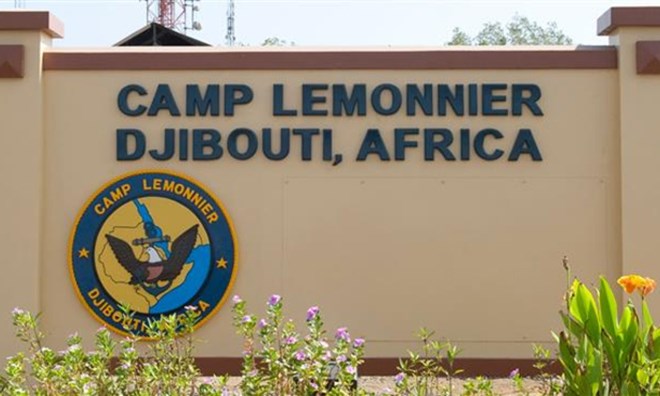
Monday April 4, 2016
Djibouti is now crowded with the military bases of several world powers. 
ARTRA, Djibouti - A French warship ploughs through the sparkling waters between Africa and Arabia on a joint training drill with the US that highlights Djibouti's growing strategic role for the world's militaries.
advertisements
On the sun-blasted rocky shores of the tiny Horn of Africa nation, some 500 French troops march alongside 50 US Marines near the town of Arta, wearing full kit in the baking heat.The training, designed to help the two allies work better together, also reflects growing international interest in the former French colony -- bordering Somalia, and just opposite Yemen.
Home to only around 800,000 people, Djibouti is now crowded with the military bases of several world powers.
Its port guards the entrance to the Red Sea and Suez Canal on one of the world's busiest shipping routes.
"This is certainly the reason why in addition to the French there are today many international forces wanting to establish a presence in Djibouti," said General Philippe Montocchio, the commander of French forces in the country.
"There are of course the Americans, the Japanese, the Italians, now the Chinese, and certainly in the near future, the Saudis."
It emerged four months ago that China has signed an agreement with Djibouti for the installation by the end of 2017 of a "naval logistics" base to accommodate up to 10,000 soldiers and serve to secure Beijing's considerable and growing interests in the wider region.
The hub will constitute China's first permanent overseas military deployment.
Terror-fighting HQ
Djibouti is already home to Camp Lemonnier, the United States' only permanent base in Africa.
It is used for covert, anti-terror and other operations in Yemen, as well as the US fight against the Islamist Shebab in Somalia and against Al-Qaeda in the Arabian Peninsula (AQAP).
Washington pays some $60 million (53 million euros) a year to Djibouti for the base.
US Major Paul L. Croom, a liason officer between the French and US militaries, said the joint drills in Djibouti "just makes sense" as the allies share key security interests in the region, including combating the jihadist threat in Africa.
"Our operability -- between the French military and US military -- is as important as it's ever been right now, and is only gaining in importance," Croom said.
"Everybody knows that a lot of that threat emanates from areas in which the United States and France have mutual interests."
European and other international navies use Djibouti's port as a base in the fight against piracy from neighbouring Somalia. These are important -- and sometimes dangerous -- waters.
With international navies at sea, Somali pirate attacks have dropped off: 176 attacks were recorded in 2011, and none in 2015, according to the EU naval force.
And just 30 kilometres (20 miles) across the Gulf of Aden lies war-torn Yemen, devastated by a civil war that has pitched Shiite Huthi rebels -- backed by Iran -- against an internationally recognised government backed by Saudi-led air strikes.
Islamist groups, including Al-Qaeda's Yemen-based branch, one of the jihadist network's most dangerous franchises, as well as Islamic State forces, have also joined the battle for power in Yemen.
"Djibouti is located exactly at the epicentre of all this jihadist movement in the Horn of Africa and the southern part of the Middle East," Montocchio said.
China, beyond its new naval base, is bankrolling major infrastructure projects in Djibouti, including transport links for key markets in neighbouring landlocked Ethiopia.
"Everybody was surprised: why China? For Djibouti, there's no question," said Djibouti's Foreign Minister Mahamoud Ali Youssouf.
"China's presence, naval or military, is part of the same logic of countries that have the ability to contribute to peace and security in a region which is very troubled."